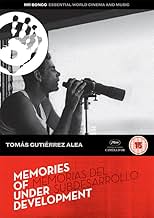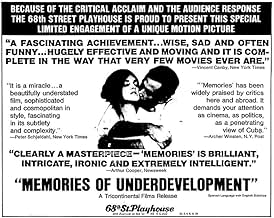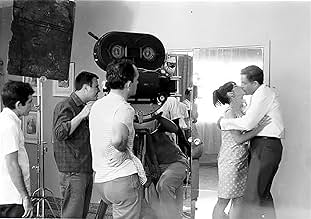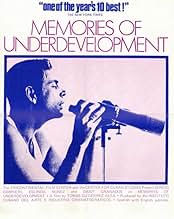A Cuban man cycles through his opinions and memories as the threat of foreign invasion intensifies and the rest of his family moves to Miami.A Cuban man cycles through his opinions and memories as the threat of foreign invasion intensifies and the rest of his family moves to Miami.A Cuban man cycles through his opinions and memories as the threat of foreign invasion intensifies and the rest of his family moves to Miami.
- Awards
- 2 wins & 2 nominations total
Featured reviews
Sergio (Sergio Corrieri) is a frustrated writer who chooses to remain in Cuba rather than follow his family to Miami just "to see how it all turns out". Though he has strong feelings for his people, he is indifferent towards politics an observer rather than a participant. Alea shows the artist as anti-hero, a man who undergoes an identity crisis, is sapped of all his vitality, feels old in his thirties, and drifts along without meaning and purpose. Unable to write the novel he wants, Sergio survives on rental income from apartments and lives in middle class luxury while around him housing is deteriorating and there are serious gas and oil shortages. He spends his days smoking in bed, looking out of a telescope through his bedroom window, taking walks, watching television, and meeting young women. He makes no pretense of his being an outsider but complains that "everything happens to me too early or too late". Hanna, the woman he says he truly loved urged him to move to New York with her and become a writer but he chose to remain in Cuba to go into the furniture business.
When Sergio makes the acquaintance of Elena (Daisy Granados), a sixteen- year-old girl who wants to be an actress, his life takes on new meaning but it is temporary and the affair ends badly. Persuading her that he knows important people in the theatrical world, he brings her to his apartment and they begin a relationship in which he tries to model her to fit his ideal of the bourgeois Cuban woman. He takes her to modern art galleries and the home of writer Ernest Hemingway to expose her to culture but it doesn't work and he complains when she doesn't fit into his mold. "She doesn't relate to things," he tells himself. "It's one of the signs of underdevelopment." Elena, like other Cuban women", he says, has an "inability to relate to things, to accumulate experience, to develop", but the stricture can just as easily refer to himself and he pays the price of this experience when the girl's parents bring a lawsuit against him for rape. Although he escapes the fate of a criminal, little by little the outside world, the world of guns, slogans, and rallies closes in on him and he feels trapped.
There are several documentary sequences interspersed throughout the film that have no apparent connection to the narrative but convey the sense that no one living in revolutionary Cuba is able to escape the presence of history. The opening sequence shows a public dance in which all the participants are black with the exception of Sergio who is white. In this sequence continued later in the film, an unnamed political leader is assassinated. In other footage, we see excerpts from the trial of counterrevolutionaries captured at Playa Giron, the site of the Bay of Pigs invasion in 1961, and a third in which we hear the voices of Castro and Kennedy during the Cuban Missile crisis.
Though Alea apparently wants us to see the fate that befalls someone who does not directly endorse revolutionary activities, he makes his character so appealing and sympathetic that, to me, the film had mixed messages. I was torn between my support of the aims of the revolution and empathizing with Sergio's disdain for the emptiness of both the Cuban bourgeois and the revolutionary leadership. An event that took place only three years after Memories of Underdevlopment was released, however, underscored the point that Sergio was making. At that time, Castro, at the First National Congress on Education and Culture, said that artists and writers must reject "all manifestations of a decadent culture, the fruit of societies that are rent by contradictions". Not surprisingly, although due to receive a special prize for the film from the U.S. National Society of Film Critics in 1973, Gutiérrez Alea was denied a visa to attend the ceremony.
The storyline itself is actually just as involving, if not more so, than the documentary side to the film, as Sergio's viewpoint of the Cuban's (misguided) revolutionary stances and problems with the bourgeoisie is a parallel to his relationships with women. The story with the young girl he seduces, and gets in trouble with, are some of my favorite scenes from the lot (and when I most woke up to watch). It's a little more tedious at times than 'Hiroshima' was as a hybrid-style film, and even with its gritty style that even in fictional form is very documentary-like, it didn't blow me away as much as it has for others who have commented here. However, I would say if you're into the history and hows and whys of the Cuban revolution and Castro and the Bay of Pigs, AND want a character to guide you through it all, this is quite the view.
Did you know
- TriviaThe first film to be made in post-revolutionary Cuba to be released in the United States.
- Quotes
Sergio Carmona Mendoyo: One thing about people that upsets me is their inability to sustain something without collapsing. Take Elena: she was totally inconsistent. Didn't relate things. That's a symptom of underdevelopment: the inability to relate things, to gain experience, develop. It's difficult here because women are conditioned by sentiments and culture. A soft environment. People waste talents on inconsistent adaptations. They always need someone to think for them.
- ConnectionsEdited into Le Huitième étage, jours de révolte (2023)
- How long is Memories of Underdevelopment?Powered by Alexa
Details
- Release date
- Country of origin
- Official sites
- Languages
- Also known as
- Memories of Underdevelopment
- Filming locations
- Production companies
- See more company credits at IMDbPro
Box office
- Gross US & Canada
- $29,647
- Opening weekend US & Canada
- $8,244
- Jan 14, 2018
- Gross worldwide
- $33,103
- Runtime1 hour 37 minutes
- Color
- Sound mix
- Aspect ratio
- 1.66 : 1
Contribute to this page










